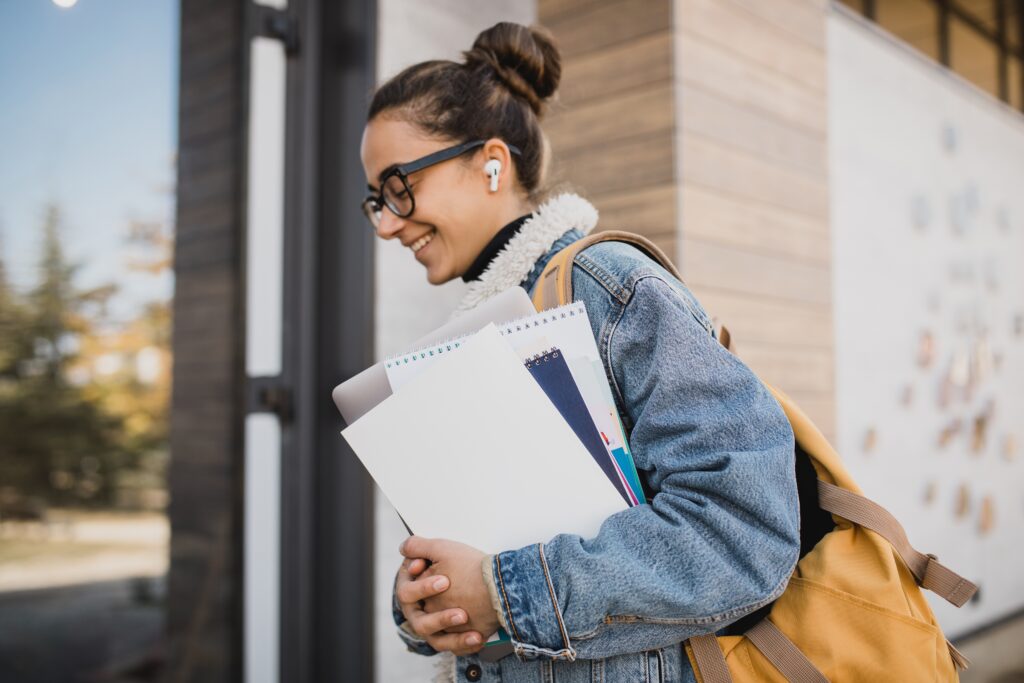Learn what it takes to nail your college interview and increase your chances of getting accepted

You’ve been working hard on your college applications—admissions essays, activity lists, letters of rec, the whole nine yards. Now you’ve hit a new part of the admissions process. You’re about to have your first college interview. What do you do??
College interviews can be intimidating, but it helps to know their purpose. Colleges don’t interview you to decide if you’re smart enough or good enough to get accepted. They’re assessing your fit for what they have to offer. Are you going to be happy and successful on their campus?
Your college interviewer wants to get a feel for your personality, your communication skills, and your level of commitment to your passions. They want to know the real you! After all, it’s hard to fit all the unique and interesting parts of you into a college application.
But knowing that college interviews aren’t intelligence tests won’t eliminate all your stress. There’s still a lot of pressure to make a good impression and present the best version of yourself. And the stakes are high—you want to get accepted!
Keep reading to learn how to prepare for your college interview, set yourself up for success, and knock it out of the park on interview day.
Preparing for your college interview
If you walk into a college interview unprepared, it’s going to show. On the other hand, if you effectively prepare for your college interview, you’re bound to put your best foot forward.
One of the first things to do is to identify what you love most about the school. What clubs are you excited to join? What opportunities do you want to take advantage of? Why is this school the perfect fit for you?
You want to prepare a strong answer to the “why this college” question. Otherwise, the interviewer will be left wondering why you deserve the seat over another, more enthusiastic student.
You’ll also want to prepare your answers to these common college interview questions:
- Tell me about yourself.
- What is your proudest achievement?
- What are your greatest weaknesses?
- Tell me about a time you failed and how you responded.
- What do you want to study in college?
- Where do you see yourself in ten years?
After outlining your responses, practice answering these questions with a friend or family member. But be careful not to memorize or over-rehearse. Stop practicing your responses once you can hit the most important points naturally and comfortably.
Here’s another thing—it’s important to find out who’s interviewing you. Most likely, it will be college alumni, but in some cases, it could be professors or admissions officers. Whoever it is, figure out where their areas of expertise lie and what they’re passionate about.
If they’re an alum, can you discover through their bio or LinkedIn page what they were involved in as a college student? Maybe you can ask about their experience in student leadership.
If you’re interviewing with a professor, look at their class topics and research areas, then prepare specific questions on those subjects. This is how you can make your college interview more personal and conversational.

Setting up your space for a virtual college interview
Many college interviews this year will be held virtually. It’s a convenient interview format, but it still presents some challenges. The last thing you want is for background clutter and chaos to detract from what you say.
If you want to be professional and effective in a virtual college interview, follow these tips for preparing your interview space:
- Sit in front of a clean background. A blank wall is best, but having a simple, non-family photo behind you can work, too.
- Arrange the light source to come from in front of you, not behind you. This keeps your face well-lit rather than hidden by shadows.
- Set your computer up so your camera is at eye level—not above or below you.
- Make sure your computer is fully charged and plugged into a reliable power source.
- Ask everyone in your household to be quiet during your interview. Even better, find a way for them to all be out of the house so you’re guaranteed to be distraction-free.
- Ensure you have a strong and reliable internet connection.
- Try out the interview software system ahead of time. You might need to create an account, and you don’t need the stress of rushing through it at the last second.
- Put your phone on silent, but store it nearby in case of a connection emergency. If your video suddenly fails, you’ll want to be able to quickly call your interviewer.
- Keep your interview area clean and free of distractions. You want to stay fully focused on your college interview.
If you’ve prepared well and created an appealing interview space, your virtual college interview is bound to go smoothly.

Making a good impression during your college interview
On interview day, you might feel some nerves, but don’t let them get to you. Stay focused and follow these five steps to achieve your best possible college interview.
First, pick a professional outfit—a nice suit jacket, slacks, tie, skirt, you name it. And here’s a pro tip: add a little bit of color or personality to your attire to make yourself extra memorable.
Now, that doesn’t mean dye your hair green. That’ll make you memorable, but perhaps not in a positive way. Instead, wear a unique piece of green jewelry or an interesting green tie. It can help you stand out just a little bit more.
Second, be early for your college interview! Being on time is the same as being late. If it’s an in-person interview, be at least 10 minutes early. If it’s virtual, log in 5 minutes before your interview slot. This shows you respect your interviewer’s time.
Third, calm your nerves and stay positive. Before your college interview begins, run through a few quick and easy calming exercises to keep your anxiety down. And think positively to yourself throughout the interview. “I’ve got this!” and “This is going great!”
Fourth, make a strong first impression. If you’re doing an in-person college interview, give a firm handshake and make eye contact while introducing yourself. And if you’re in a virtual interview, you still want to introduce yourself well. “Hello, I’m Leslie Tucker. It’s great to meet you.”
Fifth, show your enthusiasm throughout the college interview. You can convey how excited about the school you are through your body language—smile and nod when your interviewer is talking, make eye contact, put some emotion into your voice. These little things make a big difference.
If you follow these five steps, you’ll have a great college interview and make the best possible impression on your interviewer.
Following up after your college interview
When your college interview is over, you’re not done just yet. It’s important to follow up with your interviewer—it’s a classy move that demonstrates your enthusiasm for the college.
Within one to two days, email or send a handwritten note of thanks to your interviewer. You should reference a few specific parts of the interview in your letter. This shows you were paying attention and also reminds the interviewer of what you spoke about.
For example, you might write, “I really appreciated the way you described your research experience.” Or “Thank you for the advice on how to get involved freshman year.”
Your email or note should be short—about six to eight sentences. As you close, make sure to reiterate your interest in the school and thank them again for their time. Easy as pie!
Final thoughts on college interviews
There you have it! Everything you need to know to set yourself up for success in your college interviews. I hope you’re feeling much more confident now than you did a few minutes ago.
College interviews might be new and intimidating to you, but preparing for them and performing well is well within your reach. You’ve got this!
What do you think? Is there anything about college interviews that I didn’t cover? What’s making you the most nervous about your upcoming interview? Drop a comment below.
